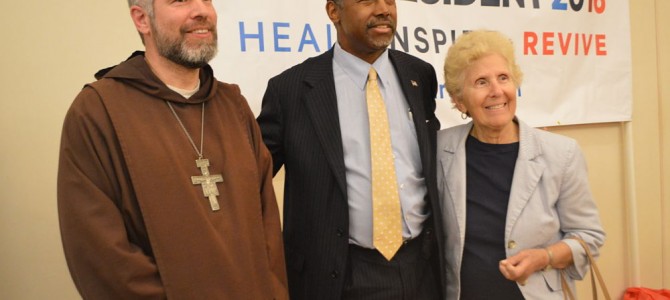
If you’re a Seventh-day Adventist who believes it’s mankind’s duty to eradicate alcoholic beverages, or a Young Earther, or a Christian Scientist, or a member of any religious denomination that embraces Ludditism, or an orthodox Muslim who believes Sharia law is a preferable legal framework to secular governance, I probably wouldn’t vote for you no matter how compelling your tax plan sounded. But that’s just me.
It doesn’t mean I’d advocate that you be prohibited from running for office, or barred from proselytizing your faith, or have you thrown into an internment camp; it only means you are mistaken about some of life’s most significant questions.
This goes for candidates who are openly socialist, believe humans have the ability to control the weather, think astrology is real (even a little), wear bowties un-ironically, or adopt regional accents during stump speeches. In a world where the state has some say in nearly all of our decisions, your ideological disposition, your behavior, your choices, they all make a difference.
And few things impact your political outlook more than faith—whether it derives from Christ, Marx, or Ayn Rand. So yes, the Constitution says that no religious test shall ever be required as a qualification to any office or public trust under the United States. What it doesn’t say is that voters are prohibited from being critical of your illiberal, troglodytic, or silly notions about the world.
When Republican presidential candidate and (surprisingly) inarticulate retired neurosurgeon Ben Carson says, “I would not advocate that we put a Muslim in charge of this nation; I absolutely would not agree with that,” he designates all American Muslims—those who are most law-abiding, secularized, moderate, and fighting radicalism themselves—as members of a Fifth Column. Framed like this, it is both ugly and prejudicial. But is any concern over religious affiliation of a candidate tantamount to bigotry? Because if it is, we are a nation of haters.
A gay man avoids voting for the evangelical Christian who contends his favorite philosopher is Jesus Christ or the practicing Catholic who regards traditional marriage as sacrament. The media would never consider such a man a bigot. In fact, they would almost certainly comprehend his reluctance. If it were intolerant to take into account someone’s faith before casting a vote, then everyone who’s ever made fun of an evolution-denying Christian would be considered a chauvinist.
Way back when Slate’s Jacob Weisberg wrote a piece titled “Romney’s Religion: A Mormon president? No way” he wasn’t flaunting his hate. He was exploring the belief system of a presidential candidate, and he determined that the former Massachusetts governor’s outlook was incompatible with his own theories of sound leadership. When late-liberal film critic Roger Ebert wrote the essay “New Agers and Creationists Should Not Be President” he wasn’t unsheathing his inner xenophobia, he was arguing that certain belief systems were incompatible with his modern conception of political office.
After Carson’s comments, Glenn Greenwald, representing a strain of thought popular among the Left, posed this thought experiment:
The best exercise w/all these statements: replace “Muslims” with “Jews” or “blacks” or “gays” & test your reaction https://t.co/jPemPdDH3j
— Glenn Greenwald (@ggreenwald) September 20, 2015
The reaction would be predictable indignation. But it’s a misleading intellectual exercise. First off, black and gay Americans aren’t prepackaged with fixed philosophical viewpoints. You can be an African-American Muslim or a black lesbian into Swedenborgianism. Second, Judaism and Islam are not the same. Just like Zen Buddhism and Islam are not the same. Or Sufi and Shia Islam are not the same. They don’t have the same relationship with secular governance. And Jews—far more an ethno-cultural label than a theological one in the United States—are members of a faith that comports with liberal societies quite well. On the other hand, we have a comprehensive list of cases that test Islamic political control, and they are less comforting. Not everywhere. Not always. But often enough.
Of course, there is the enduring claim that Christianity is no more ethically sound or preferable than any other faith. Worse, even. Here is Ta-Nehisi Coates in the The Atlantic, offering us a Chomsky word cloud:
Ben Carson is a Christian—a fact he shares in common with all our greatest domestic terrorists and self-styled Indian-killers. From slave-holding to ethnic cleansing, Christianity has repeatedly been employed to sanctify our most shameful acts. One might counter that Christianity has also been employed to inspire our most honorable acts. But this is a level of complexity that Carson’s ilk do not grant to Islam. To Carson, Islam is terror and nothing else.
This is reminiscent of the president’s allusions to the Crusades when speaking about American concerns regarding Islam. Conflating the past with the present to create moral equivalency is nothing new. But it would be worth mentioning that there are Muslims in the world who are also guilty of being self-styled Indian-killers and “slave trading and ethnic cleansing”—but in twenty-first-century Asia.
No one is innocent, of course. Humans are imperfect, sometimes evil. Christians, Jews, and so on. Some societies get better. Some allow debates over reparations for past sins, other continue in sin. But are we going to pretend that there’s no practical or moral difference between the roles Christianity and Islam play in contemporary society? I practice neither, but prefer the outcomes of one vastly over the realities of the other. You do, too, I imagine, whether you’re Amish or even if you’re a secular atheist who sports a Coexist bumper sticker.
We all discriminate. The only difference is that in the progressive mindset, only some are to be punished for it.









